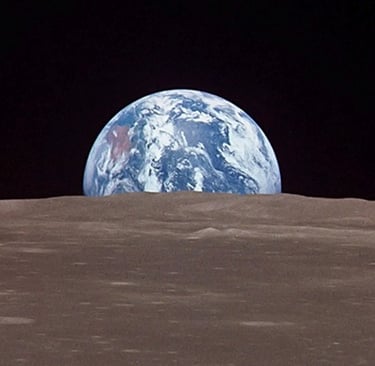Author Q and A
Questions and answers about the Assembling Terrania Cycle.
Craig Chalquist, PhD, PhD
5/8/20246 min read


What is the Assembling Terrania Cycle?
It's a speculative fiction series that charts humanity’s slow and painful but worthy struggle to become more conscious of itself as a species on the road to maturing into what we could become. The series begins with the Big Bang and ends in Terrania, a just and sustainable world civilization grown by reflective creatives. Not utopia, which humans aren’t capable of, but the good society, which we are.
Why science fiction?
My stories certainly include science fiction, but with enough fantasy and other elements to be considered speculative fiction as a whole. I like science, and I like Theodore Sturgeon’s observation that science fiction is the kind of literature that asks two big questions: What If? and, If this goes on? I’ve been reading science fiction and fantasy since childhood, and magical realism since college.
Ursula K. Le Guin pointed out that one can say a lot that is true with science fiction, perhaps more at times than with realism. You can make a point without clubbing people with it. You can suggest alternatives, subvert notions of permanence, confront helplessness, and inspire thought. If we intend to stay on this planet much longer, we’ll need to relearn how to dream and mythologize together. Speculative fiction is modern mythology.
How much are the characters in the Cycle based on real people?
A few of the characters remind me of people I know or knew, but only as points of departure. I let “my” characters imagine themselves into being as fully as they can. Even when a trait, a look, a way of speaking, etc. from some past encounter shows up in a character, it’s because that character made the quality their own. The characters in my stories really are their own people. The notion that a fictional person must be built on a dayworld one underestimates the reach of imagination.
It’s really a stylistic mistake to pattern a character closely after someone they know. Steinbeck did that with Guinevere in his Arthur retellings. He made her like his second ex-wife, which did no justice whatever to the Queen. The character is awful and spiteful and lacking in depth. He should have let her speak for herself.
Where do you get your ideas?
From fantasies, questions, dreams, conversations, free associations…but who knows from where they ultimately bubble up? From the Dreamvale, maybe.
The same with characters. Lucas showed up in my dreams at least a year before I wrote about him. Even longer for Mariam.
Is the personality of Lucas much like that of his author?
Not much. We both like myth. We like to read. We’ve been to Hong Kong. There are more differences than similarities. A few off the top of my head: He’s more extroverted. He’s a better charmer than I am and less inhibited about it. He’s more cynical, at first anyway. His personal myth definitely isn’t mine. I’m almost twenty years older, and that makes a difference. I like his black hat, though. He inspired me to buy one.
What about Simeon and Kay? How much like you are they?
Of the three narrators of the Lamplighter Trilogy, Kay is the least like me and Simeon, in some ways, is the most. But at bottom they are really their own men. I wish I were as good a cook as Simeon.
In Lamplighter you tell the tale from Kay’s point of view, but the focus is really Mariam. Why didn’t she narrate?
A few reasons. Telling the story from a woman’s perspective would feel strange and maybe impossible for me. Mariam also has a very different cultural background from mine. Additionally, she doesn’t like biography. She thinks it’s self-indulgent.
Although your stories include sex and romance, why don’t you write explicit sex scenes? Inhibitions?
(chuckle) No. Read my story “Irresistible.” I wouldn’t enjoy writing sex scenes for the same reason I wouldn’t enjoy writing down in painstaking detail what it’s like to give or receive a massage or eat an ice cream cone. I don’t see that sex scenes advance the story. I’ve never read one that did. Zelazny was asked to take one out of The Guns of Avalon, and that was a good call. I read the scene. I didn’t mind it, but it wasn’t needed.
No graphic violence either?
There is occasional violence in my novels, but nothing gory. I don’t enjoy reading graphic violence, so I don’t write it.
You’ve published nonfiction commercially. Why go independent for your fiction?
I can’t seem to squeeze my tales into the rigid formula applied by publishers and agents whose only care is making money. For them, fiction novels are commodities first. The formula is an oversimplified version of Campbell’s Hero’s Journey. I agree with PJ Manney, David Brin, Susan Kaye Quinn, Sherri L. Smith, and a growing number of other fiction writers that this template isn’t workable for serious fiction. Maybe it never was. One hero solving it all? Pfui. Life isn't like that. The longing for a hero-savior is a disguised longing for an ideal parent.
Another reason is that when you publish commercially, nobody can use those characters or settings except as fan fiction. (My continuations of stories written by Dickson, Zelazny, Asimov, and others will be available in Tributes from the Dreamvale but for free.) I wanted the Cycle to be fully available to storytellers of all kinds, including artists and performers, to play with. Please add to it.
Finally, why should it be up to a publisher to decide if a novel is any good? That, dear reader, is your call.
Will there be more novels beyond the Lamplighter Trilogy?
Probably not by me.
Since then I’ve also written more Cycle stories, one of which reached the final round of a prominent writing contest, so more might follow. I also want to pencil sketch more Cycle characters.
What is your writing process?
Get up at an ungodly hour and get to it after coffee, news, and sorting through any dreams from the previous night. I write for hours at a time, setting alarms so I don’t miss appointments. I have never had writer’s block, although I do reach points often confused with blockages, where the story can’t go forward until something percolates. When my writing stops, I just focus on something else for a few days, a week, a month, however long it takes the construction team in my unconscious to finish its labors.
I pour myself into writing to such an extent that I wish my keyboard were made so that flames would emerge, or wails of the damned, or a few somber or ecstatic bars played by Yo-Yo Ma, or celebratory fireworks, depending. Inventors, get busy.
What surprised you during the writing of your first novel, Soulmapper?
Lucas surprised me by showing up in my dreams and other people's even before I started the novel. Learning his personal myth (see the book) also surprised me very much. He told it to me while we were conversing via what Carl Jung calls active imagination. Afterward, I walked around for a while shaking my head and thinking: Of course! Of course that's your myth. In retrospect, it makes such sense.
Some of the plot twists surprised me. Mariam and her merry band came out of nowhere. I did not expect religion to poke so prominently into the story here and there. Although I'd been playing with the Ten Lamps philosophy for a few years, I did not see Lamplight coming. I did not know who was ultimately behind everything until late in the draft.
In one controversial scene, Lucas intervenes on behalf of an entire community, but they do not know about it. What do you think of what he did?
For much of his life, Lucas has been a loner, so he tends to think mainly in terms of individual intervention. Or, at least he did until he met Lucy. I would have spent more time informally talking over the situation with community members, leaders in particular, and seeing if there was any movement.
Were any novels (e.g. American Gods) an influence on the Lamplighter Trilogy?
Not in any direct way.
Authors I’ve read were more an influence than specific books they wrote. After reading PJ Manney, for instance, I studied synthetic biology in more detail and decided to include a bit. I like the environmental science (among other things) in the work of Kim Stanley Robinson. At a conference some years back, I told him half-jokingly that his novel Aurora might have solved the Fermi Paradox.
What impact do you hope the Cycle has?
I hope you enjoy it. It contains the kinds of stories I like to read. Beyond that, I hope you collect a few ideas about the power of myth and the living presence of place. I hope you come away feeling like what you and others imagine and desire together can change the world, because it can.


